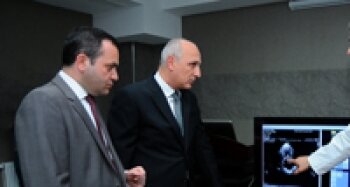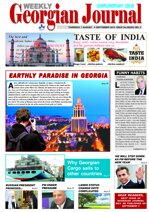 Interview with Michael Cecire, associate scholar at the Foreign Policy Research Institute
Interview with Michael Cecire, associate scholar at the Foreign Policy Research Institute- Former PM Vano Merabishvili, present-day UNM Secretary General, and ex-Healthcare Minister Zurab Chiaberashvili, currently Governor of Kakheti region, were arrested. Previous administration officials assess this fact as political persecution. Given that the West and the U.S. would prosecute vote-buying politicians, do you expect that this time Washington will respond strictly to the recent arrests of Georgian Dream’s political opponents? In your opinion, how will the arrest of former high-ranking officials affect the image of Georgia?
MichaeI Cecire: don’t expect any major response from the U.S. government. While there may be some statements to observe the rule of law and that sort of thing, this will not precipitate a major shift in thinking in Washington or Western European capitals. Those who see the new government as having committed political persecutions will see this as further evidence. And those that regard such arrests as accounting for abuses will also maintain that position. The arrests will not make a major impact on Georgia’s image, but how the investigation and prosecution is carried out will be a much bigger test. The new government cannot afford to allow for a Yanukovich-Tymoshenko situation - to which Saakashvili compares the arrests - to happen in reality or by perception.
- Mr. Michael, 7 months passed since the change of power through elections in Georgia. During this period, the processes in this country developed in a dramatic way. The process of cohabitation turned out to be difficult. How would you assess the developments in Georgia after the elections? And what is the view of the American political circles about Georgia’s new government?
- For the most part, there have been a lot of positive signs out of Georgia. Georgia’s continued Western orientation, its ongoing reforms in the Justice and Defense Ministries, decentralization initiatives, and managing the relations with Russia without sacrificing key national interests. But there are also negatives as well. The economy continues to struggle and the May 17 violence showed that the rule of law still has a long way to go. At the same time, the new government’s arguably greatest challenge is being able to communicate its progress and successes to international observers. While there is a stronger sense in the U.S. and the West that Georgia is generally headed in the right direction, most are unaware of some of the gains that have been made since the new government took office. And that feeling is likely to be shaken, or even reversed, after the events of May 17. The government may find public relations to be distasteful, but it’s absolutely necessary if it wants to communicate its progress to Western partners.
- You said - “most are unaware of some of the gains that have been made since the new government took office”. What gains do you mean? Can you specify them?
- There are gains across multiple areas. The gradual (though incomplete) restoration of media pluralism; increased transparency in several sectors; a more conciliatory and moderate approach towards the separatist regions; justice reforms, including ending the extortionist approach to plea bargaining; plans to dramatically decentralize power to the regional and municipal level; and defense reforms that increase transparency, end an unfair system of conscription, and clearly separate the Defense Ministry from the Interior Ministry. The current government has also maintained a robust pro-West course and, as one senior NATO official recently told me, has been making a stronger case for Euro-Atlantic integration. These are all preliminary assessments of course and there are still areas that need to be improved. The events of May 17 show that the new government has many areas for improvement. However, there are important things happening, yet the government has done a generally poor job of communicating its progress to the world. Ivanishvili has made it clear that he does not hold PR and symbolism to the same regard as the United National Movement did. But sometimes it is important and necessary.
- Despite the fact that our European and American partners agree that the new and previous governments do not have different approaches in foreign policy, President Saakashvili and his team insist that Ivanishvili’s government plays Russian game. In this respect, the situation has not changed since the NATO Deputy Secretary General Alexander Vershbow reiterated in an interview with the Ekho Mosvky radio station that NATO sees no difference in the positions of Georgia’s previous and new governments about the country’s Euro-Atlantic integration. In your opinion, how does the American mainstream perceive such statements by the president Saakashvili and his team and what are the conclusions?
- I am not sure that the American “mainstream” spends too much time thinking about Georgia, to be honest. Among those who are at least aware of some of the political context, President Saakashvili’s casting of Ivanishvili and the Georgian Dream as a monolithic “pro-Russian” faction has been partially successful. Those who may only be casually aware of Georgian politics are most susceptible to efforts to cast Georgian politics into simplistic, inaccurate “pro-” and “anti-Russia” camps. However, among those who seriously watch and analyze the region in the West, there is a general understanding that the new government is at least as pro-West as the one it replaced.
- President Saakashvili along with his team-mates visited the USA and held meetings at different levels. Are you aware of what messages president Saakashvili received from his American partners?
-I am not specifically aware of what was said during Saakashvili’s meetings in the U.S. However, he did meet with Senator Marco Rubio, which is itself telling. Rubio is considered a rising star in the Republican Party and belongs to a wing of the party that favors an internationalist, hawkish foreign policy. This has typically translated to the support for Georgia overall and, on an operational level, strong personal relationships with key members of the United National Movement (and particularly the self-described liberals). I would surmise that Saakashvili is looking to extend this special relationship with the next generation of Republican leaders. How the rising leaders of both parties manage their relationship with Georgia will be of genuine importance. It will be better for Georgia if the bilateral relationship is institutionalized at the country-to-country level rather than brokered through individual or partisan relationships.
- President Saakashvili said that during his visit to the USA he held meetings with ‘Democrats’ and ‘Republicans’ - most promising young politicians, who are viewed as future leaders of these parties. It is clear that the time of Bush and McCain is over, and the era of Obama and Biden will soon be over; but in your opinion, who does he consider to be the most promising politicians of ‘Democrats’ and ‘Republicans’? What is the likelihood of their leadership and what can their appearance on the arena of the U.S. politics foretell?
- Marco Rubio is considered a front-runner for leadership within the Republican Party. Other such Republican rising stars are Bobby Jindal, the governor of Louisiana; Kentucky Senator Rand Paul; Texas Senator Ted Cruz; New Hampshire Senator Kelly Ayotte; and Virginia Governor Bob McDonnell. In simplistic terms, Rubio and Ayotte might be best understood as largely continuing the status quo within the Republican Party. Jindal and McDonnell have developed reputations for being popular policy innovators as state governors. Paul and Cruz, however, represent the growing libertarian constituency within the Republican Party. While Democrats have their own rising stars — Virginia Senator Mark Warner, New York Governor Andrew Cuomo, and Newark Mayor Cory Booker come to mind — the next political cycle will most likely be dominated by status quo figures like former Secretary of State Hillary Clinton and Vice President Joe Biden, both of whom are expected to contest for the 2016 Democratic presidential nomination. The greatest change for Georgia will come if Republicans capture the White House in 2016 and the winning candidate comes from a non-traditional wing of the Party.
- The events of May 17 revealed the drawbacks and the problems of the Georgian society on its way to a truly democratic society. The pro-Western forces of our society express their profound concern about the incident and like the previous government; they demand the punishment of guilty persons. However, there is another problem, we face - the question is put as follows: ‘Clerics may have been actively engaged in the events of May 17, but unlike the former government, they did not participate in the harassment of business and media, in massive human rights violations or in processes that led to the fact that this country does not have a free judiciary’. In this situation, why does the West demand to punish the clerics and at the same time, defends the officials of previous government? As we can see, the situation is complicated. How do you assess the events of May 17 and the situation established in this country after those events?
-The biggest complaint about the Church’s role in the May 17 pogroms aren’t its manipulation of governmental or institutional mechanisms, but that it leveraged its standing in the country to agitate against vulnerable minority groups in Georgia. Eyewitness accounts, as well as photo and video footage, show members of the clergy actively and enthusiastically involved in the violent counter demonstrations. Given the Church’s powerful social and symbolic role in the country, its participation in events on and leading up to May 17 makes them at least partially culpable. The Church may not be institutionalizing human rights violations, but it has helped create the conditions where human rights abuses against minorities is allowed de facto sanction. The May 17 violence recalls the Father Basil era, when religious minorities were frequently and openly attacked by extremist mobs. That kind of impunity cannot be allowed to take root again. Those Westerners who defend the previous government but call for members of the clergy to be punished may be hypocritical in some ways, but it doesn’t mean that the Church shouldn’t be held at least partially responsible. However, it’s hard to see how the previous government would have responded to such a situation. When the Orthodox Parents Union attacked LGBT activists in the past — albeit on a smaller scale — little was done then, either. The reality is that all the major political factions in Georgia are wary of the Church’s social and latent political power. All this said, I don’t think this is necessarily a game changer. This is hardly the first time that extremist violence has flared up in Georgia. And while the crowd was certainly large, it’s still not a statistical game changer. Most Georgians may hold anti-homosexual beliefs, but I expect that those willing to resort to such violence remain a small, though outspoken, minority. What is important for Georgia’s democratic development isn’t necessarily forcing Georgians to countenance alternative lifestyles, but to inculcate a respect for minority rights whether or not they agree with them.
- How would you assess the current situation in Russia? According to many Russian experts, dismissal from the government of its ‘sovereign democracy’ ideologist Vladislav Surkov means that the oligarchic capitalism in Russia is over. Putin leads Russia from authoritarianism to dictatorship. The split between the elites is obvious. In your opinion, how realistically do the Russian experts assess the situation in the country and how will the processes in Russia develop and how it will affect the international situation and politics?
- ‘Sovereign’ or ‘managed’ democracy were terms that better described global sentiment than that of the Russian government. It was more an attempt to placate international critics than a means to find an adequate definition of the Russian system. Now that democracy is noticeably stagnating worldwide — and even regressing in key areas — Russia needn’t be constrained by the pretense. While there are some slight pseudo-democratic features as part of the Russian system, these are more cosmetic than substantive. Russia has been de facto authoritarian for quite some time already (though it’s not pervasive on all levels). I expect Russian experts largely realize this to be the case, though some would not use such language because it reflects poorly on the system they are perpetuating. I am not sure how things in Russia will unfold, but the current course is unsustainable with growing domestic unrest, an insurgency in the North Caucasus, demographic issues, and the collapsing of the pipeline-energy paradigm.
- According to some experts, the bombing effected by Chechen terrorists in Boston improved U.S.-Russian relations. Many people say that Washington backed off before the ‘white bear’, and even made concessions to Moscow. As an example, they mention the fact that the USA has declined deployment of a missile-defense shield in Europe, which Moscow has long opposed to. USA’s restrained position on Syria is another example. In your opinion, what is happening in Russian – U.S. relations? And how can it affect the Georgian - Russian relations?
- The Obama administration may have made some concessions in Europe and Eurasia to Russia as part of the original “reset,” but that era is long over. Like many administrations before it, Washington has attempted outreach to Moscow and has been disappointed by the results. While there were improvements on some smaller, practical measures here and there, the reset was predicated on the idea that the U.S. could find common ground with Russia and build on that. But U.S. and Russian interests are, in many respects, fundamentally at odds. Much of Russian domestic policy, for example, depends on maintaining that the West and Euro-Atlantic institutions are an existential threat. U.S.-Russia relations are reverting to their “normal” state, in which practical cooperation in narrow areas are pursued but the two states acknowledge and quietly act on an underlying state of competition. Georgian-Russian relations will not be affected much unless the U.S. is party to some kind of issue with Georgia to which Russia strongly objects. But the same underlying divergence of national interests can be said of Georgia and Russia as well. While the change in tone from Tbilisi has noticeably improved relations, genuine normalization will never happen unless Russia withdraws its support for the separatist regimes or Georgia agrees to submit to Russian suzerainty. Neither will happen.






















































